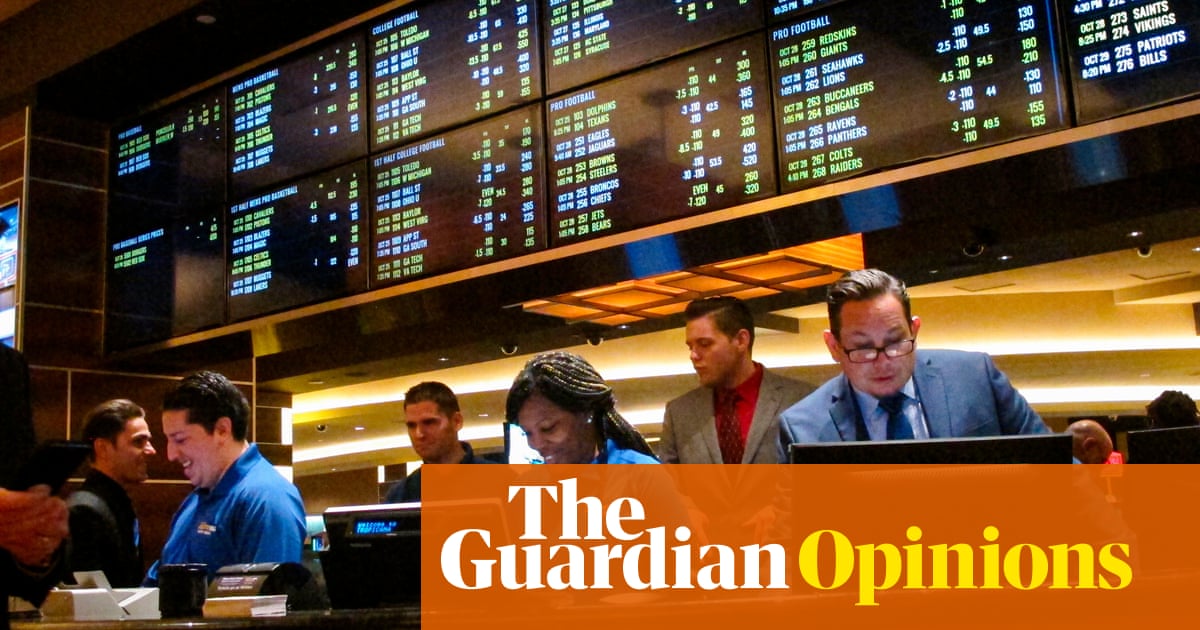
Gambling’s glitter is blinding US policymakers to its social costs
As gambling revenue has increased in recent years, so has the need for gambling prevention and treatment – but the industry has largely avoided this issue
The gambling industry contributes billions to the US economy, provides jobs and has become a popular form of entertainment. Legislators and government officials celebrate the huge tax revenue generated by this booming industry.
But this financial focus should not overshadow the importance of addressing the growing number of problem gamblers.
As gambling revenue has increased in recent years, so has the need for gambling prevention and treatment. Since sports betting was legalized in New Jersey in 2018, calls to our 800-Gambler problem gambling helpline have increased by 277%: a telltale sign that we are in the midst of a public health crisis. The Council on Compulsive Gambling of New Jersey, which I lead, has exceeded its 2024 treatment budget by 22%.
The industry – and, to some extent, public officials – has largely avoided the issue. Rather than acknowledge the problems that have already arisen, they have instead chosen to focus on how to prevent issues from arising. Much of this is pinned around “responsible gambling” measures, which let gamblers self-impose limits on the dollars and time spent betting.
The lack of attention on problem gambling and the related social cost calls into question the much-ballyhooed economic upside of the recent explosion of legal betting.
Widespread stigma and the absence of physical signs, like those seen with substance abuse, is why disordered gambling is often referred to as a “hidden addiction”.
Consider a case in point: after viewing excessive, repetitive advertisements presenting a glamorous, exciting activity, with offers to place free bets, and a “you can’t lose” message, an individual decides to place their first bet. Perhaps reassured by the “responsible gambling” messages touted by the industry and government regulators, they have every intention of gambling responsibly.
Upon placing their first bet, they win, experience an adrenaline rush and are captivated by the game. They continue to place more bets, win some more, then begin to lose and, eventually the “responsible gambling” principles fall by the wayside. After a short time, they are hooked and find themselves in a downward spiral. Given the embarrassment they may face declaring their addiction, they keep the secret to themselves, not considering its impact on their loved ones.
According to the California Council on Problem Gambling, the average problem gambler negatively affects seven people with whom they have close ties. In an effort to recoup losses, they proceed to drain college and retirement accounts and acquire second mortgages, most likely without their family’s knowledge. They hide their addiction due to feelings of failure and do not admit they have a problem until they have hit rock bottom, after the damage has occurred.
Gambling disorder is perpetuated by our pro-gambling culture, which glamorizes gambling and disguises its dark side. Outside of commercials including a small (and often statutory) reference to a helpline, the public is rarely informed about the devastation this addiction can cause.
In an effort to exercise some degree of civic responsibility, the industry and government have promoted “responsible gambling” as a way to promote healthy gambling practices.
This serves as camouflage by and for the industry and government. After all, problem gambling prevention may adversely affect the financial health of the industry – and the related tax revenue it generates.
The industry often removes two key letters from its references to “gambling”, which becomes “gaming” in much of its messaging. This slight wording change attempts to disguise the very essence of gambling: that it involves risk.
As words are softened and problem gambling levels downplayed, the severity of this disorder continues to be hidden. More people, oblivious to its dark side, are developing gambling problems resulting in devastating circumstances.
By solely promoting “responsible gambling”, the industry and our lawmakers are contributing to and benefiting from the “hidden” aspect of this addiction.
The gambling industry is highly lucrative, and provides much-needed tax revenue. This narrow financial focus, however, does not consider the detrimental social impact of problem gambling.
According to the National Council on Problem Gambling, the annual social cost of disordered gambling in the US – including job losses and gambling-related criminal justice – amounts to approximately $14bn. And this number does not account for those who have lost homes, savings and relationships, and are forced to initiate bankruptcy filings. The most troubling statistic is that an estimated 19.2% of those struggling with a gambling problem contemplate suicide, according to a study, the highest among any addiction.
The Guardian reported in January that there are economists who have cautioned that the cost of higher problem gambling rates could be “roughly equal” to a state’s takings and implies that the degree of economic gain could in fact be a mirage.
While gambling’s economic benefits are questionable, the need for greater attention to the public good is now beyond dispute. Gambling disorder has developed into a public health issue. The public must be made aware. This addiction should be taken seriously. Government representatives must also be mindful of the related fallout.
Additional funding for prevention and treatment is sorely needed. Mandated advertising parameters are long overdue. Warning labels, similar to those on tobacco products, should be posted at brick-and-mortar casinos and online gambling sites. And it is vital for public service announcements to be aired to educate the public about the addictive nature of gambling.
Without these reforms gambling addiction will continue to escalate, and leave millions of casualties in its wake.
-
Felicia Grondin, MPA, is the executive director of the Council on Compulsive Gambling of New Jersey
